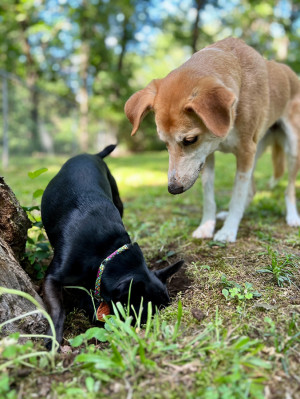A Guide to Roundworms in Dogs: Understand and Treat This Issue
Yes, it’s gross. But it can be very, very bad if you aren’t proactive.

Share Article
In This Article:
What Are Roundworms? What Causes Roundworm Infections? How is a Roundworm Infection Diagnosed? What Are the Treatments? How to Prevent Roundworm in Dogs
Having a pet is about as good as it gets, but pet-parenting still comes with some not-so-pleasant moments. One of those includes finding out that your dog has worms. And this often happens soon after you get your new puppy. Many puppies come with worms, and you don’t know until you see one in vomit or stool, or the veterinarian tells you after a fecal test at the pup’s first check-up.
If you haven’t had a pet with worms before, it can be alarming — and to some degree, it should be. Worms can cause mild digestive upset but can also lead to more serious complications. Fortunately, your vet will know exactly how to get rid of those nasty things and prevent your dog from becoming infected again.
Roundworms are one of the most common intestinal parasites in dogs, and can affect a pup of any age. It’s important to know how dogs get roundworms, which symptoms you may see, how to treat the parasites, and how to prevent future infections. This guide will walk you through all those details.

What are roundworms?
Roundworms are intestinal parasites that can infect your dog and cause GI disturbances. There are two species: toxocara canis and toxascaris leonine. Toxocara canis is the primary roundworm found in dogs, while toxascaris leonine is more common in cats. They are long, spaghetti-like parasites that live in your pet’s intestines. They can rob your pup of nutrients, leading to malnutrition and other health problems.
Roundworms are especially common in puppies, because they can be transmitted from the mother before or after birth when nursing. Although adult dogs can also get infected, they tend to have stronger immune responses that control the parasitic load.
Common symptoms that roundworm causes
Some dogs may not show any signs. But others may exhibit these common symptoms.
A pot-bellied appearance, especially in puppies
Diarrhea or soft stool
Vomiting (sometimes with visible worms)
Weight loss, despite a good appetite
A dull coat and poor overall condition
Coughing (if larvae migrate to the lungs)
In severe cases, a dog can have so many worms that they can obstruct the intestines, leading to life-threatening complications.
What causes a roundworm infection in dogs?
Roundworms can infect your pup in several ways.
Mother-to-puppy transmission: Puppies can get roundworms from their pregnant mother or after birth, when they are nursing.
Ingesting roundworm eggs: If a dog who has worms poops on the ground, another dog can become infected if they swallow roundworm eggs.
Eating infected prey: Roundworms can also infect small animals such as rodents. The larvae within the rodent can infect dogs who hunt or scavenge.
Contaminated water or environment: Roundworm eggs can survive in the soil for years, making reinfection possible.
Prevention is very important, since roundworms are very contagious. Regular deworming is essential to keep your dog protected.
How is a roundworm infection diagnosed?
Periodic fecal exams should be performed. A fecal exam is the process by which a sample of your dog’s stool is examined under a microscope. If there are eggs, they are usually visible. In some cases, you may see adult worms in your dog’s vomit or poop, which tells you that your dog has worms. However, since eggs are microscopic, a veterinary fecal test is the most reliable way to confirm an infection.
What are the treatments for roundworms in dogs?
Fortunately, it is fairly easy to treat roundworms in pets. Your veterinarian will prescribe a dewormer and give it to your dog, or send it home with you. Common medications include:
Pyrantel pamoate
Fenbendazole
Milbemycin oxime
Moxidectin
Selamectin
Puppies need more than one treatment. They should be dewormed at two, four, six, and eight weeks of age. They should then have another fecal exam to ensure all the roundworms are gone. It’s also important for your dog to be prescribed a preventative to ward off future infections.
How to prevent a roundworm infection in dogs
It is very important to keep your dog free from roundworms. Fortunately, there are a few different ways to accomplish that. Here are some essential steps.
Regular deworming: Follow your vet’s recommendations for preventive treatments. If your dog is on a heartworm preventative (which all dogs should be), many medications can prevent roundworms, too. Even better, some medications protect against heartworms, roundworms, fleas, ticks, mites, and lice. Protecting your pet against all types of parasites has become very easy.
Good hygiene: One common way your dog acquires roundworm is by ingesting eggs that contaminate the environment. Always clean up dog feces promptly.
Avoid contaminated areas: Prevent your dogs from eating feces, scavenging, or digging in potentially infected areas.
Proper nutrition: Feeding your pup a well-balanced, high-quality protein diet will keep their immune system healthy and help your dog fight infections.
Routine veterinary checkups: Regular fecal exams help detect parasites early.
By performing these preventive measures, you can significantly reduce the risk of roundworm infections in your dog.
FAQs
Are roundworms dangerous to people?
Yes, if a person ingests roundworm larvae, they can travel to various organs in their body, causing damage and potentially serious illness. This progress is called visceral larva migrans. It can be especially dangerous for children, and can cause eye damage and neurological issues. To prevent this from happening, wash hands after handling pets, keep play areas and sandboxes clean and covered, and ensure dogs receive regular deworming treatments.
How long does it take for a dog to get rid of roundworms?
Most medications start working within 24 hours, but that doesn’t mean all the worms are gone. It will take several weeks before all the adult worms are dead, and that larvae that have matured into adults are also killed. This generally takes more than one dose of medication. Veterinarians also recommend additional fecal exams after treatment to ensure all roundworms have been eradicated.
Do you need to clean your house if your dog has roundworms?
Yes, roundworms are hardy and difficult to kill. They live in the environment, so you must clean both inside and outside your home.
Wash your dog’s bedding, toys, and food bowls with hot water and disinfectant.
Vacuum carpets and floors thoroughly to remove any eggs.
Disinfect hard surfaces with a pet-safe cleaner.
Pick up and dispose of feces immediately to prevent environmental contamination.
Since common household cleaners do not easily kill roundworm eggs, steam-cleaning or using diluted bleach (for non-porous surfaces) may be more effective.
Bottom line
Roundworms are a common but preventable health issue in dogs.
You can keep your dog safe and healthy by understanding the risks, recognizing symptoms, and following proper treatment and prevention methods.
If you suspect your dog has roundworms, consult your veterinarian for diagnosis and treatment.
Routine deworming and good hygiene practices will help protect both your dog and your family from these parasites.
References
Domachowske, Joseph B, and Manika Suryadevara. “Roundworms.” Springer EBooks, 1 Jan. 2020, pp. 343–349, https://doi.org/10.1007/978-3-030-50873-9_56.opens in new tab
“Principles and Practices of Canine and Feline Clinical Parasitic Diseases.” Wiley EBooks, Wiley, 12 Jan. 2024. https://onlinelibrary.wiley.com/doi/book/10.1002/9781394158256opens in new tab.
Traversa, Donato. “Pet Roundworms and Hookworms: A Continuing Need for Global Worming.” Parasites & Vectors, vol. 5, no. 1, 10 May 2012, https://doi.org/10.1186/1756-3305-5-91opens in new tab.

Dr. Shelby Neely, DVM
Dr. Shelby Neely is a freelance writer and veterinarian who graduated from the University of Pennsylvania School of Veterinary Medicine and has practiced veterinary medicine for 30 years, specializing in small animals. Her work has appeared in Allivet, AsktheCatDoctor, WhiskerDocs, Ask the Cat Doctor Radio, Ask the Cat Doctor TV, and numerous other websites, brochures, newsletters, newspapers, and ebooks. In her spare time, Dr. Neely likes to spend time with her three children, two grandchildren, three cats, two grand-cats, and five grand-dogs.
Related articles
![Two dogs digging outside in the dirt.]()
Types of Worms in Dogs: How to Detect and Treat Worms in Dogs
Here are the types of worms your pup could get, how you know they have them in the first place, and how to get rid of them for good.
![Full length portrait of young African-American woman walking dog in park outdoors in Summer.]()
What to Do If You Find Worms in Your Dog’s Poop
Hopefully this isn’t info you’ll have to reference often, but here’s what you should know.
![a Dalmation with heartworms comforted by owner]()
My Dog Is Heartworm Positive: Signs, Diagnosis, and Treatments
If heartworm happened to my dog, it can happen to yours.
![A happy woman is lying on a bed, her dog smelling her face.]()
9 Diseases You Can (and Definitely Can’t) Catch From Your Dog
Here’s what you can scratch off your “Worry About This” list.
![A beautiful woman lying down in the park hugging her cute little dog.]()
Common Health Conditions in Shelter Dogs That Really Aren’t a Big Deal
Seriously, everything on this list is super treatable.







